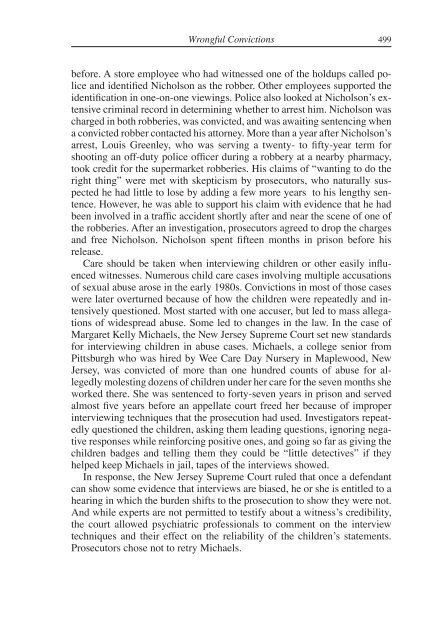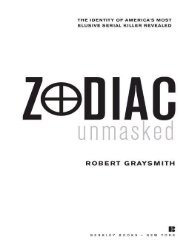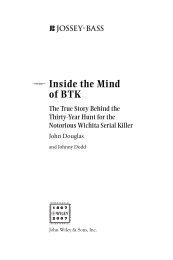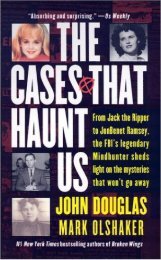- Page 2:
Crime Classification Manual A STAND
- Page 6 and 7:
Crime Classification Manual A STAND
- Page 8 and 9:
Contents Preface to the Second Edit
- Page 10:
To the victims of violent crimes an
- Page 13 and 14:
x PREFACE TO THE SECOND EDITION The
- Page 15 and 16:
xii PREFACE TO THE SECOND EDITION v
- Page 18 and 19:
Introduction Violent crime is of in
- Page 20 and 21:
Introduction 3 arrestees. Of those
- Page 22 and 23:
Introduction 5 inals far outshadowe
- Page 24 and 25:
Introduction 7 making a decision on
- Page 26 and 27:
Introduction 9 trast, the product t
- Page 28 and 29:
Introduction 11 a sexual homicide.
- Page 30 and 31:
Introduction 13 one homicidal event
- Page 32 and 33:
Introduction 15 Body disposition It
- Page 34:
PART ONE Crime Analysis and Investi
- Page 37 and 38:
20 CRIME CLASSIFICATION MANUAL No o
- Page 39 and 40:
22 CRIME CLASSIFICATION MANUAL The
- Page 41 and 42:
24 CRIME CLASSIFICATION MANUAL CASE
- Page 43 and 44:
26 CRIME CLASSIFICATION MANUAL fill
- Page 45 and 46:
28 CRIME CLASSIFICATION MANUAL Augu
- Page 47 and 48:
30 CRIME CLASSIFICATION MANUAL Vasq
- Page 49 and 50:
32 CRIME CLASSIFICATION MANUAL Chuc
- Page 51 and 52:
34 CRIME CLASSIFICATION MANUAL This
- Page 53 and 54:
36 CRIME CLASSIFICATION MANUAL Russ
- Page 55 and 56:
38 CRIME CLASSIFICATION MANUAL the
- Page 57 and 58:
40 CRIME CLASSIFICATION MANUAL dome
- Page 59 and 60:
42 CRIME CLASSIFICATION MANUAL seve
- Page 62 and 63:
CHAPTER 3 Prescriptive Interviewing
- Page 64 and 65:
Prescriptive Interviewing 47 on fav
- Page 66 and 67:
Prescriptive Interviewing 49 Causat
- Page 68 and 69:
Prescriptive Interviewing 51 in the
- Page 70 and 71:
Prescriptive Interviewing 53 • Of
- Page 72 and 73:
CHAPTER 4 Classifying Crimes by Sev
- Page 74 and 75:
Classifying Crimes by Severity 57 p
- Page 76 and 77:
Killing a witness to obstruct testi
- Page 78 and 79:
Classifying Crimes by Severity 61 B
- Page 80 and 81:
Classifying Crimes by Severity 63 T
- Page 82 and 83:
Classifying Crimes by Severity 65 D
- Page 84 and 85:
Classifying Crimes by Severity 67 P
- Page 86 and 87:
Classifying Crimes by Severity 69 T
- Page 88 and 89:
Classifying Crimes by Severity 71 o
- Page 90 and 91:
CHAPTER 5 VICAP The Violent Crimina
- Page 92 and 93:
VICAP 75 criminal offender, or offe
- Page 94 and 95:
VICAP 77 tified and it is determine
- Page 96 and 97:
VICAP 79 days. Nevertheless, it is
- Page 98 and 99:
VICAP 81 that is better done by est
- Page 100 and 101:
VICAP 83 exceeded the accuracy of t
- Page 102 and 103:
VICAP 85 years ago in the alley, th
- Page 104 and 105:
VICAP 87 consists of more than 18 F
- Page 106:
VICAP 89 consulted on the Seattle,
- Page 110 and 111:
CHAPTER 6 Homicide 100: Criminal en
- Page 112 and 113:
Homicide 95 crime index, these offe
- Page 114 and 115:
Homicide 97 tated, involving offens
- Page 116 and 117:
Homicide 99 100: CRIMINAL ENTERPRIS
- Page 118 and 119:
Homicide 101 Postoffense, the offen
- Page 120 and 121:
Homicide 103 The ambush, sniper sty
- Page 122 and 123:
Homicide 105 Defining Characteristi
- Page 124 and 125:
Search Warrant Suggestions Homicide
- Page 126 and 127:
Homicide 109 Crime Scene Indicators
- Page 128 and 129:
Homicide 111 White’s associates i
- Page 130 and 131:
Homicide 113 A hostage/barricade si
- Page 132 and 133:
Homicide 115 tributing to the Jacks
- Page 134 and 135:
Homicide 117 neighborhood church tw
- Page 136 and 137:
Homicide 119 Common Forensic Findin
- Page 138 and 139:
Homicide 121 Both victims were user
- Page 140 and 141:
Homicide 123 first conviction using
- Page 142 and 143:
Homicide 125 trade; firearms; phone
- Page 144 and 145:
Homicide 127 When he was not making
- Page 146 and 147:
Homicide 129 107: INSURANCE-RELATED
- Page 148 and 149:
Homicide 131 kind should be looked
- Page 150 and 151:
Homicide 133 passenger side of the
- Page 152 and 153:
Homicide 135 the victim, motivated
- Page 154 and 155:
Homicide 137 prison guard doing rou
- Page 156 and 157:
Homicide 139 and managed. He had al
- Page 158 and 159:
Homicide 141 lent crime, a homicide
- Page 160 and 161:
Homicide 143 crime, so this additio
- Page 162 and 163:
Forensic Findings Homicide 145 All
- Page 164 and 165:
Homicide 147 are involved, there is
- Page 166 and 167:
Homicide 149 below the diagnosis of
- Page 168 and 169:
Homicide 151 120: PERSONAL CAUSE HO
- Page 170 and 171:
Homicide 153 focused on the victim.
- Page 172 and 173:
Homicide 155 (Lennon’s wife was J
- Page 174 and 175:
Search Warrant Suggestions Homicide
- Page 176 and 177:
Homicide 159 preceded one week to t
- Page 178 and 179:
Homicide 161 unopened a few days la
- Page 180 and 181:
Homicide 163 no guardrails, it is a
- Page 182 and 183:
Homicide 165 Although the vast majo
- Page 184 and 185:
Homicide 167 the victim, or the “
- Page 186 and 187:
Homicide 169 Isolated in her privac
- Page 188 and 189:
Homicide 171 a young white male spr
- Page 190 and 191:
Homicide 173 setbacks probably woul
- Page 192 and 193:
Homicide 175 murder. More than one
- Page 194 and 195:
Homicide 177 inability to handle or
- Page 196 and 197:
Homicide 179 He had once declined a
- Page 198 and 199:
Homicide 181 offender and not be ob
- Page 200 and 201:
Homicide 183 from it, and it is dis
- Page 202 and 203:
Homicide 185 behind, finishing Gian
- Page 204 and 205:
Homicide 187 of the more public mur
- Page 206 and 207:
Homicide 189 be less organized than
- Page 208 and 209:
Homicide 191 walked from the front
- Page 210 and 211:
Homicide 193 was struck on the elbo
- Page 212 and 213:
Homicide 195 cumstantially to sever
- Page 214 and 215:
Homicide 197 Staging. Religion-driv
- Page 216 and 217:
Homicide 199 While the location of
- Page 218 and 219:
Homicide 201 Defining Characteristi
- Page 220 and 221:
Search Warrant Suggestions Homicide
- Page 222 and 223:
Homicide 205 their deathbed. Many n
- Page 224 and 225:
Homicide 207 When Jones’s advisor
- Page 226 and 227:
Homicide 209 within twenty-five min
- Page 228 and 229:
Homicide 211 From November 9, 1981,
- Page 230 and 231:
Homicide 213 Defining Characteristi
- Page 232 and 233:
Homicide 215 The organized sexual m
- Page 234 and 235:
Homicide 217 posal. Duct tape resid
- Page 236 and 237:
Homicide 219 The body may be positi
- Page 238 and 239:
Homicide 221 ever, her young age an
- Page 240 and 241:
Homicide 223 133: SEXUAL HOMICIDE,
- Page 242 and 243:
Crime Scene Indicators Homicide 225
- Page 244 and 245:
Homicide 227 torture involving exce
- Page 246 and 247:
Homicide 229 present in injuries in
- Page 248 and 249:
Victimology Homicide 231 Lucinda Sc
- Page 250 and 251:
Homicide 233 females, within a narr
- Page 252 and 253:
Homicide 235 life imprisonment. Bit
- Page 254 and 255:
Homicide 237 cially. The proximity
- Page 256 and 257:
Investigative Considerations Homici
- Page 258 and 259:
Homicide 241 In mid-August of that
- Page 260 and 261:
Homicide 243 Psychiatrist Ames Robe
- Page 262 and 263:
Homicide 245 Defining Characteristi
- Page 264 and 265:
Homicide 247 On top of the grave si
- Page 266 and 267:
Homicide 249 contained in the Book
- Page 268 and 269:
Homicide 251 social, economic, or r
- Page 270 and 271:
Homicide 253 Postincident analysis
- Page 272 and 273:
Homicide 255 the SLA, were sentence
- Page 274 and 275:
Homicide 257 stormed the house with
- Page 276 and 277:
Homicide 259 fear of the offenders,
- Page 278 and 279:
CHAPTER 7 Arson/Bombing 200: Vandal
- Page 280 and 281:
Arson/Bombing 263 that location. An
- Page 282 and 283:
Arson/Bombing 265 instigator of the
- Page 284 and 285:
Arson/Bombing 267 the broken window
- Page 286 and 287:
Search Warrant Suggestions Arson/Bo
- Page 288 and 289:
Arson/Bombing 271 be a serial arson
- Page 290 and 291:
Arson/Bombing 273 CASE STUDY: 221:
- Page 292 and 293:
Arson/Bombing 275 “DNA torch,”
- Page 294 and 295:
Arson/Bombing 277 Most murder conce
- Page 296 and 297:
Arson/Bombing 279 loss—for exampl
- Page 298 and 299:
Arson/Bombing 281 that he had disco
- Page 300 and 301:
Investigative Considerations Arson/
- Page 302 and 303:
Arson/Bombing 285 gation, both the
- Page 304 and 305:
Arson/Bombing 287 Metesky was found
- Page 306 and 307:
Arson/Bombing 289 Serial arsonists
- Page 308:
Arson/Bombing 291 Arson specialists
- Page 311 and 312:
294 CRIME CLASSIFICATION MANUAL 313
- Page 313 and 314:
296 CRIME CLASSIFICATION MANUAL Pre
- Page 315 and 316:
298 CRIME CLASSIFICATION MANUAL •
- Page 317 and 318:
300 CRIME CLASSIFICATION MANUAL Def
- Page 319 and 320:
302 CRIME CLASSIFICATION MANUAL Eve
- Page 321 and 322:
304 CRIME CLASSIFICATION MANUAL 310
- Page 323 and 324:
306 CRIME CLASSIFICATION MANUAL a h
- Page 325 and 326:
308 CRIME CLASSIFICATION MANUAL pus
- Page 327 and 328:
310 CRIME CLASSIFICATION MANUAL The
- Page 329 and 330:
312 CRIME CLASSIFICATION MANUAL evi
- Page 331 and 332:
314 CRIME CLASSIFICATION MANUAL 313
- Page 333 and 334:
316 CRIME CLASSIFICATION MANUAL 313
- Page 335 and 336:
318 CRIME CLASSIFICATION MANUAL Out
- Page 337 and 338:
320 CRIME CLASSIFICATION MANUAL Off
- Page 339 and 340:
322 CRIME CLASSIFICATION MANUAL CAS
- Page 341 and 342:
324 CRIME CLASSIFICATION MANUAL Off
- Page 343 and 344:
326 CRIME CLASSIFICATION MANUAL rea
- Page 345 and 346:
328 CRIME CLASSIFICATION MANUAL thr
- Page 347 and 348:
330 CRIME CLASSIFICATION MANUAL Cri
- Page 349 and 350:
332 CRIME CLASSIFICATION MANUAL Off
- Page 351 and 352:
334 CRIME CLASSIFICATION MANUAL mut
- Page 353 and 354:
336 CRIME CLASSIFICATION MANUAL ins
- Page 355 and 356:
338 CRIME CLASSIFICATION MANUAL nie
- Page 357 and 358:
340 CRIME CLASSIFICATION MANUAL loc
- Page 359 and 360:
342 CRIME CLASSIFICATION MANUAL •
- Page 361 and 362:
344 CRIME CLASSIFICATION MANUAL Out
- Page 363 and 364:
346 CRIME CLASSIFICATION MANUAL he
- Page 365 and 366:
348 CRIME CLASSIFICATION MANUAL a c
- Page 367 and 368:
350 CRIME CLASSIFICATION MANUAL Bla
- Page 369 and 370:
352 CRIME CLASSIFICATION MANUAL 390
- Page 371 and 372:
354 CRIME CLASSIFICATION MANUAL The
- Page 373 and 374:
356 CRIME CLASSIFICATION MANUAL bro
- Page 375 and 376:
358 CRIME CLASSIFICATION MANUAL con
- Page 377 and 378:
360 CRIME CLASSIFICATION MANUAL 402
- Page 379 and 380:
362 CRIME CLASSIFICATION MANUAL beh
- Page 381 and 382:
364 CRIME CLASSIFICATION MANUAL his
- Page 383 and 384:
366 CRIME CLASSIFICATION MANUAL Sea
- Page 385 and 386:
368 CRIME CLASSIFICATION MANUAL sta
- Page 387 and 388:
370 CRIME CLASSIFICATION MANUAL In
- Page 389 and 390:
372 CRIME CLASSIFICATION MANUAL Com
- Page 391 and 392:
374 CRIME CLASSIFICATION MANUAL by
- Page 393 and 394:
376 CRIME CLASSIFICATION MANUAL in
- Page 395 and 396:
378 CRIME CLASSIFICATION MANUAL Inv
- Page 397 and 398:
380 CRIME CLASSIFICATION MANUAL Ms.
- Page 399 and 400:
382 CRIME CLASSIFICATION MANUAL The
- Page 401 and 402:
384 CRIME CLASSIFICATION MANUAL att
- Page 403 and 404:
386 CRIME CLASSIFICATION MANUAL one
- Page 405 and 406:
388 CRIME CLASSIFICATION MANUAL Inv
- Page 407 and 408:
390 CRIME CLASSIFICATION MANUAL tap
- Page 409 and 410:
392 CRIME CLASSIFICATION MANUAL dam
- Page 411 and 412:
394 CRIME CLASSIFICATION MANUAL On
- Page 413 and 414:
396 CRIME CLASSIFICATION MANUAL 523
- Page 415 and 416:
398 CRIME CLASSIFICATION MANUAL pro
- Page 417 and 418:
400 CRIME CLASSIFICATION MANUAL CAS
- Page 419 and 420:
402 CRIME CLASSIFICATION MANUAL 540
- Page 421 and 422:
404 CRIME CLASSIFICATION MANUAL to
- Page 423 and 424:
406 CRIME CLASSIFICATION MANUAL har
- Page 425 and 426:
408 CRIME CLASSIFICATION MANUAL Nev
- Page 427 and 428:
410 CRIME CLASSIFICATION MANUAL mil
- Page 429 and 430:
412 CRIME CLASSIFICATION MANUAL hom
- Page 431 and 432:
414 CRIME CLASSIFICATION MANUAL He
- Page 433 and 434:
416 CRIME CLASSIFICATION MANUAL The
- Page 435 and 436:
418 CRIME CLASSIFICATION MANUAL pro
- Page 437 and 438:
420 CRIME CLASSIFICATION MANUAL the
- Page 439 and 440:
422 CRIME CLASSIFICATION MANUAL thi
- Page 442 and 443:
CHAPTER 12 Classifying Internet Chi
- Page 444 and 445:
Table 12.1. Frequencies of Trader,
- Page 446 and 447:
Classifying Internet Child Sex Offe
- Page 448 and 449:
Classifying Internet Child Sex Offe
- Page 450 and 451:
Classifying Internet Child Sex Offe
- Page 452:
PART THREE Methods of Killing
- Page 455 and 456:
438 CRIME CLASSIFICATION MANUAL age
- Page 457 and 458:
440 CRIME CLASSIFICATION MANUAL tol
- Page 459 and 460:
442 CRIME CLASSIFICATION MANUAL Tim
- Page 461 and 462:
444 CRIME CLASSIFICATION MANUAL The
- Page 463 and 464:
446 CRIME CLASSIFICATION MANUAL Ris
- Page 465 and 466: 448 CRIME CLASSIFICATION MANUAL Spr
- Page 467 and 468: 450 CRIME CLASSIFICATION MANUAL Inv
- Page 469 and 470: 452 CRIME CLASSIFICATION MANUAL ten
- Page 471 and 472: 454 CRIME CLASSIFICATION MANUAL her
- Page 473 and 474: 456 CRIME CLASSIFICATION MANUAL emo
- Page 475 and 476: 458 CRIME CLASSIFICATION MANUAL Mal
- Page 477 and 478: 460 CRIME CLASSIFICATION MANUAL par
- Page 479 and 480: 462 CRIME CLASSIFICATION MANUAL lat
- Page 481 and 482: 464 CRIME CLASSIFICATION MANUAL him
- Page 483 and 484: 466 CRIME CLASSIFICATION MANUAL Aft
- Page 485 and 486: 468 CRIME CLASSIFICATION MANUAL not
- Page 488 and 489: CHAPTER 14 Homicidal Poisoning ARTH
- Page 490 and 491: Homicidal Poisoning 473 reported du
- Page 492 and 493: Homicidal Poisoning 475 of the patt
- Page 494 and 495: Homicidal Poisoning 477 Table 14.1.
- Page 496 and 497: Homicidal Poisoning 479 tected only
- Page 498 and 499: Homicidal Poisoning 481 neighbors b
- Page 500: Homicidal Poisoning 483 charges, an
- Page 503 and 504: 486 CRIME CLASSIFICATION MANUAL pas
- Page 505 and 506: 488 CRIME CLASSIFICATION MANUAL out
- Page 507 and 508: 490 CRIME CLASSIFICATION MANUAL Mor
- Page 509 and 510: 492 CRIME CLASSIFICATION MANUAL (20
- Page 512 and 513: CHAPTER 16 Wrongful Convictions Cau
- Page 514 and 515: Wrongful Convictions 497 year since
- Page 518 and 519: Wrongful Convictions 501 Reproducti
- Page 520 and 521: Wrongful Convictions 503 “I stopp
- Page 522 and 523: Wrongful Convictions 505 out the po
- Page 524 and 525: Wrongful Convictions 507 “The rec
- Page 526 and 527: CHAPTER 17 Criminal Confessions Ove
- Page 528 and 529: Criminal Confessions 511 individual
- Page 530 and 531: Interview Principle: Preserve the E
- Page 532 and 533: Criminal Confessions 515 • Most o
- Page 534 and 535: Criminal Confessions 517 press for
- Page 536 and 537: Bibliography Altman, L. K. (2001, D
- Page 538 and 539: Bibliography 521 Cohen, M. L., et a
- Page 540 and 541: Bibliography 523 Icove, D. J., & Es
- Page 542 and 543: Bibliography 525 McAuliffe, W. (200
- Page 544 and 545: Bibliography 527 Sifakas, C. (1981)
- Page 546 and 547: About the Editors John E. Douglas,
- Page 548 and 549: About the Editors 531 Archdiocese o
- Page 550 and 551: About the Contributors Susan H. Ada
- Page 552 and 553: A Adams, S. A., 509, 515 Alberti, P
- Page 554 and 555: F Faherty, Kevin, 240 Ferguson, Car
- Page 556 and 557: McClenahan, Shawn, 79 McDade, J., 4
- Page 558: Vincent, Jan-Michael, 370 Vollmer,
- Page 561 and 562: 544 SUBJECT INDEX Arson, extremist-
- Page 563 and 564: 546 SUBJECT INDEX Computer crimes,
- Page 565 and 566: 548 SUBJECT INDEX Georgia, Gregg v.
- Page 567 and 568:
550 SUBJECT INDEX Mississippi, Minn
- Page 569 and 570:
552 SUBJECT INDEX Remote Sensing La
- Page 571 and 572:
554 SUBJECT INDEX Threats, communic





